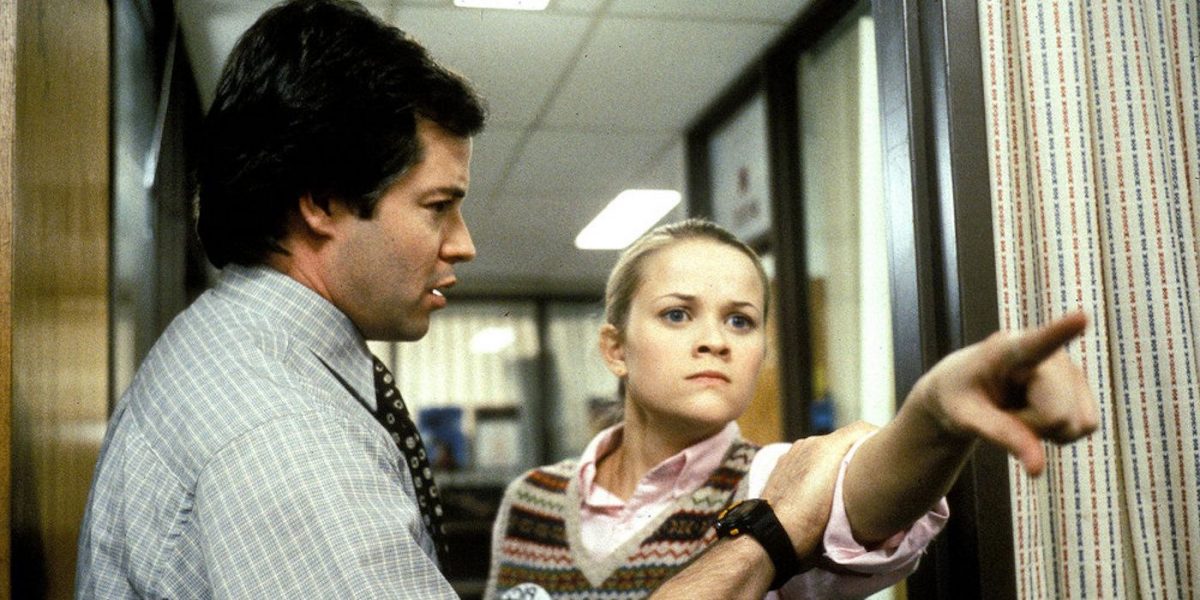
‘Election’ Was the Cynical 90s Movie No One Expected
Dec 20, 2022
Moviegoers in May 1999 did not receive the film that they were expecting. While Election is an R-rated high school comedy, this was no American Pie. The film’s marketing misdirected audiences into believing that Alexander Payne’s film was an easy-going, good time at the movies. This was nothing to think too hard about. The comedic hook is right there in the trailer: students and teachers take a trivial high school class presidency too seriously, and hijinks ensue. The movie, based on the novel by Tom Perrotta of the same name, was even produced by MTV Productions. In what world could this actually be a satire on U.S. politics filled with black comedy and harsh tonal shifts throughout? Well, since this was the year 1999, when movies were consistently at such a high creative level with their concepts and execution, this bait-and-switch should not have come as a surprise. The film has developed a cult following, and Paramount Plus has recently announced plans to develop a sequel with Payne and star Reese Witherspoon returning.
‘Election’s Tone Fools You
Election’s plot revolves around a student body election at a high school in Omaha, Nebraska, where an overachieving, go-getter student, Tracy Flick (Witherspoon), runs for class president while a down-on-his-luck social studies teacher, Jim McAllister (Matthew Broderick), attempts to sabotage Tracy’s campaign – just because he doesn’t like her. The plot lures audiences into familiar narrative beats: the smart and intuitive student versus the bumbling teacher. The film has a good sense of when to utilize the common tropes of these character archetypes, likewise with their comic sensibilities. However, there is a dark underbelly to this seemingly innocent story, and it pulls the rug out from under viewers throughout the narrative.
Payne would go on to maneuver the same technique with About Schmidt and Sideways, which are two seemingly benign road trip movies that are secretly bleak depictions of directionless men in their elder/middle ages. The first wrench thrown into the dynamic of Tracy and Jim is the revelation that the former had a romantic relationship with another teacher, who also happened to be a good friend of Jim. The film goes as far as making a hard cut from the introduction of Tracy through Jim’s perspective to this teacher describing a sexual encounter with her. Whether it’s because he feels his friend was unfairly maligned or sees Tracy as losing her innocence, there is something more nefarious behind Jim’s hostility towards her.
Jim McAllister Is an Unreliable Narrator
Jim McAllister is a classic case of the unreliable narrator. The audience is led to believe that, due to the testimony of his narration, Jim is the most all-around beloved teacher of the school. While this claim is never officially disputed, by observing the actions and motivations behind him from the beginning, it’s pretty clear that there’s nothing redeemable about Jim. He is ultimately a shallow man stuck in the circularity of his dead-end life. In the DVD commentary of Election, Payne analyzed Jim’s life as being in a stagnant loop, never progressing beyond the circular life of high school and always returning to the same place.
RELATED: 9 Essential Reese Witherspoon Performances, From Legally Blonde to Big Little Lies
The iconography of circles can be seen throughout the film. This is probably the most accurate reading behind Jim’s dislike of Tracy. Stemming from petty jealousy, Jim knows that Tracy will go on to accomplish great things beyond his restrictive purview of high school. Casting Matthew Broderick, whose breakout role as the titular lead in Ferris Bueller’s Day Off represented the typical “cool kid” who behaved against the system, as a frustrated teacher burnt out by the dormant spirit of high school is ingenious. It works as a commentary on the societal ideas of what the ideal high school teen ought to be, and Jim McAllister is like the grown-up version of Ferris Bueller’s worst nightmare: stuck at a dead end in life.
Tracy Flick Is a Complex Character
In the case of Tracy Flick, the film takes a neutral approach to how it wants the audience to feel about her. In fact, viewers will probably sympathize with her one minute and then be disgusted by her presence just a scene later. From an outsider’s perspective of the film without seeing it, Tracy comes off as a caricature of the high school overachiever. From a weaker filmmaker and less convincing actor, Tracy would play as a one-note routine. While the character is meant to highlight the most cynical roots of the film’s satirical themes, the movie never loses sight that she is a complicated individual with human feelings.
Image Via Paramount Pictures
She manages to jump from two extremes of behavior and emotion, garnering audience hatred after tearing down campaign posters belonging to her opposition in the hallways in a tantrum in one scene but can amass audience compassion after she is sobbing hysterically in her room after losing the election in another. Without explicitly stating so, Election reinforces to the audience that, even in the midst of this political satire, the film is dealing with adolescence. Tracy is just an insecure young adult who used a meaningless election as a panacea to her own issues, as crumbs are given to the viewer throughout the film that she lacks a proper family structure. Once again, as the audience gets a handle on the film’s tone, it takes a sharp turn away from tongue-in-cheek satire to raw and primal emotions.
Refuse and Waste Are Recurring Themes of ‘Election’
On the DVD commentary, Payne noted the iconography of refuse and waste throughout Election. Characters are often seen throwing away trash, walking by garbage pails, and driving by waste dump trucks. Two of the more pivotal scenes in the narrative involve refuse, including Tracy tossing the ripped-down posters into the dumpster and the discovery of the trash pail that contained the two votes for Tracy that Jim purposefully threw away, causing Tracy to lose. Payne was unable to precisely dissect what the symbolism of garbage represented in the text. Subjectively speaking, its essence is quite literal. Tracy and Jim think that if they dispose of evidence of their chicanery, karma will not come back to haunt them.
If they can cleanse themselves of their sins, they can move on from the past. This is where the film’s harshness manifests in its truest form. Despite any audience sympathy that these characters receive, the film’s closing sequences demonstrate that these people will never change. Tracy continues to be an irritating perfectionist in college, and Jim, now resigned as a teacher after tampering with the election, moves to New York to be a museum tour guide, and is still a sad sack. His feelings of resentment towards Tracy are reignited when he sees her on the streets, now working as a staff member for a congressman. In a petty rage, Jim hurls a cup of soda at their limousine, and he runs away to evade authorities.
‘Election’ Is a Universally Cynical Movie
In the end, Election shares an equal disdain for almost everyone on screen, including the film’s setting and basic plot as a whole. The one audience avatar in the story, Tammy Metzler (Jessica Campbell), who pokes holes into the election and brings rational sense into the situation, is ultimately disregarded once the character is disqualified from the vote. Today, the retrospective fascination towards the films of 1999 is their unconscious rhetoric surrounding the future and the start of the new millennium. In this case, Election uses the canvas of a harmless student body election to examine the deeper cynicism beneath the surface, showing the audience that the future does not look so bright. The outcome of the election was a footnote, and the high school setting was one of the least glamorous ever depicted in the canon of high school movies. Filmmakers have a tendency to romanticize the luster of high school, but Payne in the DVD commentary likened the visual aesthetic of the school (the film was shot in a real high school in Nebraska) to a factory or prison. It’s not surprising that this movie performed poorly at the box office. No one could have imagined a that a high school movie featuring two of the most likable screen presences of their time as leads could be this punishing to its audience.
Publisher: Source link
Here's Everything You Missed At The 2024 Emmy Awards, If You Didn't Get A Chance To Watch Them
The Schitt's Creek cast hilariously reunited on stage to end the 2024 Emmy Awards.View Entire Post › Disclaimer: This story is auto-aggregated by a computer program and has not been created or edited by filmibee.Publisher: Source link
Sep 19, 2024
Nick Cannon Shares Update on Ex Mariah Carey After Deaths in Family
Mariah Carey is showing that she can make it through the rain. The singer's ex-husband, Nick Cannon—with whom she shares 13-year-old twins Monroe and Moroccan—shared an update on how she's holding up after losing her mother, Patricia Hickey, and sister, Alison Carey, on the same…
Sep 19, 2024
Liza Colón-Zayas Gave A Powerful Speech At Emmys 2024
Liza Colón-Zayas Gave A Powerful Speech At Emmys 2024 Liza Colón-Zayas just became the first Latina to win the Emmy Award for Outstanding Supporting Actress in a Comedy Series! She won for her incredible portrayal of Tina Marrero in The…
Sep 18, 2024
1,000 Bottles of Baby Oil Seized in Home Raid
The rapper’s associates—referred to in the indictment as the “Combs Enterprise,” including supervisors, security and household staff, assistants and other employees—are accused of facilitating Freak Offs by booking hotel rooms and stocking them with necessary supplies, cleaning the rooms, arranging…
Sep 18, 2024











